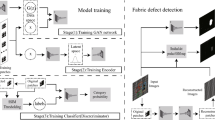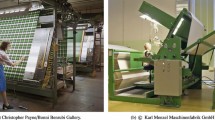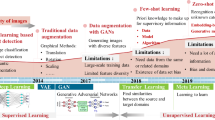Abstract
Fabric defect detection is a critical task in the textile industry. Efficient and accurate automated detection schemes, such as computer vision fabric quality inspection, are urgently needed. However, traditional feature-based methods are often limited and difficult to implement universal solutions in industrial scenarios due to their specificity towards certain defect types or textures. Meanwhile, machine learning methods may face difficulties in harsh industrial production environments due to insufficient data and labels. To address these issues, we propose an unsupervised defect detection framework based on knowledge distillation, which includes a visual localization module to assist with the detection task. Our approach significantly improves classification and segmentation accuracy compared to previous unsupervised methods. Besides, we perform a comprehensive set of ablation experiments to determine the optimal values of different parameters. Furthermore, our method demonstrates promising performance in both open databases and real industrial scenarios, highlighting its high practical value.
H. Liu and S. Wang—Both authors contributed equally to this research.
Access this chapter
Tax calculation will be finalised at checkout
Purchases are for personal use only
Similar content being viewed by others
References
Akcay, S., Atapour-Abarghouei, A., Breckon, T.P.: GANomaly: semi-supervised anomaly detection via adversarial training. In: Jawahar, C.V., Li, H., Mori, G., Schindler, K. (eds.) ACCV 2018. LNCS, vol. 11363, pp. 622–637. Springer, Cham (2019). https://doi.org/10.1007/978-3-030-20893-6_39
Alruwais, N., Alabdulkreem, E., Mahmood, K., Marzouk, R.: Hybrid mutation moth flame optimization with deep learning-based smart fabric defect detection. Comput. Electr. Eng. 108, 108706 (2023). https://doi.org/10.1016/j.compeleceng.2023.108706
Bergmann, P., Fauser, M., Sattlegger, D., Steger, C.: Mvtec ad-a comprehensive real-world dataset for unsupervised anomaly detection. In: Proceedings of the IEEE/CVF Conference on Computer Vision and Pattern Recognition, pp. 9592–9600 (2019)
Bergmann, P., Löwe, S., Fauser, M., Sattlegger, D., Steger, C.: Improving unsupervised defect segmentation by applying structural similarity to autoencoders. ar**v preprint ar**v:1807.02011 (2018)
Defard, T., Setkov, A., Loesch, A., Audigier, R.: PaDiM: a patch distribution modeling framework for anomaly detection and localization. In: Del Bimbo, A., et al. (eds.) ICPR 2021. LNCS, vol. 12664, pp. 475–489. Springer, Cham (2021). https://doi.org/10.1007/978-3-030-68799-1_35
Dehaene, D., Frigo, O., Combrexelle, S., Eline, P.: Iterative energy-based projection on a normal data manifold for anomaly localization. In: International Conference on Learning Representations (2019)
H, Z.H.: Fabric defect detection based on improved weighted median filtering and k-means clustering. J. Textiles 40(12), 50–56 (2019)
Hanbay, K., Talu, M.F., Özgüven, Ö.F., Öztürk, D.: Fabric defect detection methods for circular knitting machines. In: 2015 23nd Signal Processing and Communications Applications Conference (SIU), pp. 735–738. IEEE (2015)
He, K., Zhang, X., Ren, S., Sun, J.: Deep residual learning for image recognition. In: Proceedings of the IEEE Conference on Computer Vision and Pattern Recognition, pp. 770–778 (2016)
Hu, G., Huang, J., Wang, Q., Li, J., Xu, Z., Huang, X.: Unsupervised fabric defect detection based on a deep convolutional generative adversarial network. Text. Res. J. 90(3–4), 247–270 (2020)
**g, J., Wang, Z., Rtsch, M., Zhang, H.: Mobile-unet: an efficient convolutional neural network for fabric defect detection. Textile Res. J. 004051752092860 (2020)
Mei, S., Wang, Y., Wen, G.: Automatic fabric defect detection with a multi-scale convolutional denoising autoencoder network model. Sensors 18(4), 1064 (2018)
Perera, P., Nallapati, R., Bing, X.: OcGAN: one-class novelty detection using GANs with constrained latent representations. In: 2019 IEEE/CVF Conference on Computer Vision and Pattern Recognition (CVPR) (2019)
Pourkaramdel, Z., Fekri-Ershad, S., Nanni, L.: Fabric defect detection based on completed local quartet patterns and majority decision algorithm. Expert Syst. Appl. 198, 116827 (2022)
Salehi, M., Sadjadi, N., Baselizadeh, S., Rohban, M.H., Rabiee, H.R.: Multiresolution knowledge distillation for anomaly detection. In: Proceedings of the IEEE/CVF Conference on Computer Vision and Pattern Recognition, pp. 14902–14912 (2021)
Schlegl, T., Seeböck, P., Waldstein, S.M., Langs, G., Schmidt-Erfurth, U.: f-AnoGAN: fast unsupervised anomaly detection with generative adversarial networks. Med. Image Anal. 54, 30–44 (2019)
Shumin, D., Zhoufeng, L., Chunlei, L.: Adaboost learning for fabric defect detection based on hog and SVM. In: 2011 International Conference on Multimedia Technology, pp. 2903–2906. IEEE (2011)
Simonyan, K., Zisserman, A.: Very deep convolutional networks for large-scale image recognition. ar**v preprint ar**v:1409.1556 (2014)
W, L.: Deep learning-based algorithm for online detection of fabric defects. Comput. Appl. 39(7), 2125 (2019)
Yin, G.L.: Fabric defect detection method based on edge detection and wavelet analysis. J. Jiangnan Univ. Nat. Sci. Ed. 10(6), 5 (2011)
Z, J.: Real-time defect detection algorithm for fabric based on s-yolov3 model. Adv. Lasers Optoelectron. 57(16), 161001 (2020)
Z, Z.: Deep learning in fabric defect detection. Foreign Electron. Meas. Technol. 38(8), 110–116 (2019)
Acknowledgements
This work was partly supported by the Science and Technology Innovation 2030-Key Project (Grant No. 2021ZD0201404), Key Technology Projects in Shenzhen (Grant No. JSGG20220831110203007) and Aminer. ShenZhen.ScientificSuperBrain.
Author information
Authors and Affiliations
Corresponding author
Editor information
Editors and Affiliations
Rights and permissions
Copyright information
© 2024 The Author(s), under exclusive license to Springer Nature Singapore Pte Ltd.
About this paper
Cite this paper
Liu, H., Wang, S., Meng, C., Zhang, H., **ao, X., Li, X. (2024). Unsupervised Fabric Defect Detection Framework Based on Knowledge Distillation. In: Luo, B., Cheng, L., Wu, ZG., Li, H., Li, C. (eds) Neural Information Processing. ICONIP 2023. Communications in Computer and Information Science, vol 1968. Springer, Singapore. https://doi.org/10.1007/978-981-99-8181-6_26
Download citation
DOI: https://doi.org/10.1007/978-981-99-8181-6_26
Published:
Publisher Name: Springer, Singapore
Print ISBN: 978-981-99-8180-9
Online ISBN: 978-981-99-8181-6
eBook Packages: Computer ScienceComputer Science (R0)




